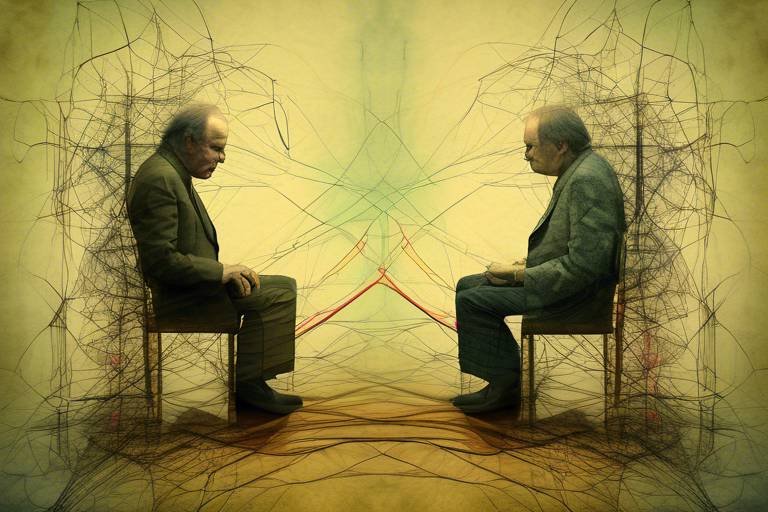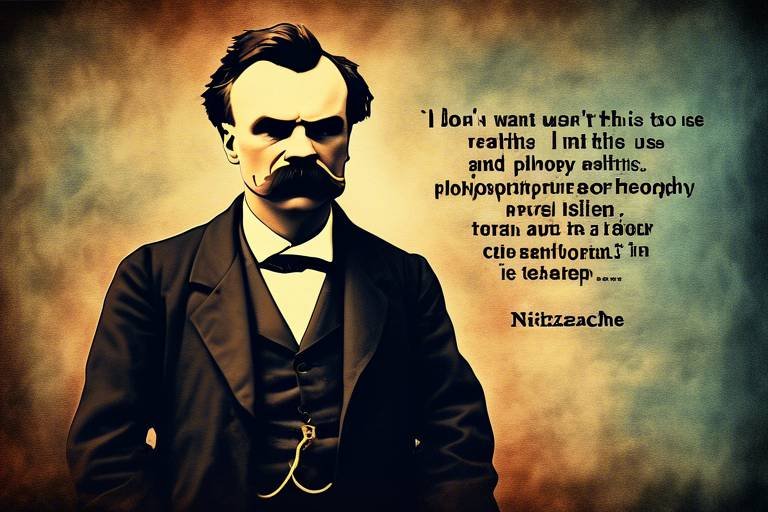Childhoods Revisited - Philosophical Reflections on Growing Up
Childhood is a fascinating tapestry woven from threads of experiences, emotions, and social interactions. It is a time when the world feels vast and full of possibilities, yet it is also a period marked by innocence and vulnerability. As we delve into the philosophical implications of childhood experiences, we uncover how these formative years shape our identities, beliefs, and perspectives as we transition into adulthood. It’s almost like being handed a blank canvas at the start of a journey, where every brushstroke—every memory—contributes to the masterpiece of who we become.
What exactly constitutes childhood? It’s not just a simple age range; rather, it encompasses a rich emotional, psychological, and social landscape. During these years, we learn not just through formal education but through the myriad of interactions we have with family, friends, and the world around us. Each laugh, each tear, and each moment of joy or sorrow contribute to our personal development. In essence, childhood is a profound period of exploration and discovery, where the seeds of our future selves are sown.
Memory plays a pivotal role in shaping our perceptions of childhood. Have you ever found yourself reminiscing about the carefree days of your youth? This nostalgia isn’t just a longing for the past; it’s a powerful force that influences our adult behavior and choices. The memories we hold dear can serve as guiding stars, illuminating our paths as we navigate the complexities of adulthood. They remind us of who we were and, in many ways, help us decide who we want to be.
So, how do childhood experiences contribute to the formation of our identities? The interplay between memory, environment, and personal growth is intricate and profound. Our early experiences act as building blocks, shaping our beliefs, values, and even our aspirations. For instance, a child who is encouraged to explore their creativity may grow into an innovative adult, while another who faces constant criticism might struggle with self-esteem issues. It’s a delicate dance of influences, where every step taken in childhood echoes into the future.
Families play a critical role in childhood development, acting as the first teachers and role models. The relationships we form with family members have a lasting impact on our identities and values. For example, a nurturing environment fosters confidence and security, while a chaotic home life can lead to anxiety and insecurity. Understanding this dynamic is essential, as it highlights the profound influence our familial bonds have on shaping who we are. The love, support, and even the challenges we encounter within our families are intricately woven into the fabric of our identities.
Let’s not forget the importance of friendships during childhood! Peer relationships are often the first taste of social interaction outside the family unit. These friendships teach us invaluable social skills and emotional intelligence. Through playdates, school projects, and even the occasional fallout, we learn about cooperation, empathy, and conflict resolution. It’s like a mini-society where we practice the art of being human, preparing us for the more complex relationships we will navigate in adulthood.
Reflecting on the life lessons learned during childhood is crucial. These lessons inform our adult decision-making and ethical considerations. For instance, the concept of sharing learned during playtime may influence our collaborative spirit in the workplace. Similarly, overcoming childhood fears can instill resilience, equipping us to face life’s challenges head-on. Each lesson learned is a stepping stone, guiding us toward becoming more thoughtful and compassionate individuals.
Exploring various philosophical viewpoints on childhood reveals how different thinkers have understood the significance of early life experiences. From the innocence of childhood celebrated by romantic philosophers to the more critical views of existentialists, the discussion is rich and varied. Each perspective offers unique insights into how childhood shapes our understanding of existence and morality.
Existentialist thinkers often focus on themes of freedom, choice, and the search for meaning. In the context of childhood, this perspective emphasizes the idea that our early experiences are not just passive occurrences but active choices that shape our identities. The freedom to explore, make mistakes, and learn from them is a fundamental aspect of growing up. It’s a journey of self-discovery where each choice contributes to the mosaic of our existence.
Finally, the intersection of developmental psychology and philosophical thought provides a framework to understand cognitive and emotional growth during childhood. Theories by luminaries like Piaget and Vygotsky offer insights into how children learn and develop, emphasizing the importance of social interactions and cultural context. This scientific understanding complements philosophical reflections, creating a more holistic view of childhood as a critical period of development.
- What is the significance of childhood experiences?
Childhood experiences are foundational in shaping our identities, values, and beliefs, influencing how we navigate adulthood. - How do family relationships impact childhood development?
Family dynamics provide the first social interactions we have, greatly affecting our emotional and psychological growth. - Can nostalgia affect adult behavior?
Yes, nostalgia can influence decision-making and behavior by reminding us of our formative experiences and the lessons learned. - What role do peers play in childhood?
Peer relationships help develop social skills and emotional intelligence, preparing us for future interactions.

The Nature of Childhood
Childhood is often viewed as a magical time, a period filled with wonder, exploration, and the unfiltered joy of discovery. But what truly constitutes childhood? It's not merely the years spent before adulthood; it's a complex tapestry woven from emotional, psychological, and social threads. Each of these dimensions plays a pivotal role in shaping who we become as adults.
Emotionally, childhood is characterized by intense feelings. Children experience a wide range of emotions—from the exuberance of playing with friends to the heartache of losing a favorite toy. These feelings are not just fleeting moments; they lay the groundwork for how we will manage emotions later in life. For instance, a child who learns to express their feelings in a supportive environment is likely to grow into an adult who communicates openly and effectively.
Psychologically, childhood is a time of rapid cognitive development. As children navigate their environments, they begin to form their own beliefs and understandings of the world. This is where the seeds of critical thinking are sown. The way a child interprets their experiences can significantly affect their worldview. For example, a child who perceives their surroundings as safe and nurturing is more likely to develop a positive self-image compared to one who grows up in a chaotic or threatening environment.
Socially, childhood is the arena where we learn the rules of engagement with others. Through interactions with family and peers, children develop essential social skills. These early relationships are crucial; they teach us about trust, cooperation, and empathy. Imagine childhood as a grand stage where we practice the roles we will play in adult life. The friends we make, the conflicts we resolve, and the lessons we learn all contribute to our social repertoire.
To summarize, the nature of childhood is not a one-dimensional experience but rather a multifaceted journey that shapes our identities. It is a blend of emotional richness, psychological growth, and social learning. As we transition into adulthood, the echoes of our childhood experiences continue to resonate, influencing our beliefs, behaviors, and interactions with the world around us.
In understanding childhood, we must also recognize the importance of context. The environment in which a child grows up—whether it be a bustling city or a quiet countryside—can greatly impact their development. The availability of resources, cultural influences, and family dynamics all play a significant role in shaping a child's experiences. This leads us to consider how these factors intertwine to create a unique childhood for each individual.
Ultimately, childhood is a foundational phase of life that deserves our attention and reflection. It is during these formative years that we begin to construct the narratives we carry into adulthood, making it essential to understand the profound implications of our early experiences.

Memory and Nostalgia
Ah, memory—the magical tapestry that weaves together the fabric of our childhood! It’s fascinating how memories can evoke a whirlwind of emotions, taking us back to a time when life was simpler, yet so profoundly impactful. Nostalgia, that bittersweet feeling of longing for the past, plays a pivotal role in shaping our perceptions of childhood. It’s like a time machine that transports us back, allowing us to relive moments that have left an indelible mark on our hearts and minds. But why do we cling to these memories so tightly? Perhaps it’s because they form the foundation of our identities, influencing our beliefs and choices as we navigate adulthood.
The significance of memory in shaping our perceptions cannot be overstated. Each recollection is a brushstroke on the canvas of our lives, contributing to our understanding of who we are. As we reminisce about our childhood adventures, we often find ourselves reflecting on the lessons learned and the experiences that molded us into the individuals we are today. Whether it’s the joy of a carefree summer day spent playing outside or the heartache of a childhood friendship gone awry, these moments linger in our minds, shaping our emotional landscape.
Moreover, the role of nostalgia in influencing adult behavior is equally intriguing. Have you ever found yourself scrolling through old photos, feeling a rush of warmth as you recall those innocent days? This phenomenon isn’t just sentimental; it can actually guide our decisions and actions. Research shows that nostalgic memories can enhance our mood, boost our self-esteem, and even foster social connections. It’s as if our past experiences whisper to us, reminding us of our roots and the values we hold dear.
Let’s take a moment to explore how nostalgia can manifest in our lives. It may come in various forms, such as:
- Revisiting childhood locations that hold special significance
- Listening to music that transports us back to a different time
- Engaging in activities or hobbies we loved as children
These nostalgic triggers not only bring joy but also serve as reminders of our personal growth and the journey we’ve undertaken. They can spark conversations, build connections, and even inspire creativity. In a world that often feels chaotic and fast-paced, nostalgia offers a comforting refuge, a reminder that our childhood experiences are not just relics of the past but integral pieces of our identity.
As we delve deeper into the interplay between memory and nostalgia, we uncover the profound impact these elements have on our lives. Childhood memories act as a lens through which we view the world, influencing our perspectives, relationships, and choices. They are the stories we tell ourselves, shaping our narratives and guiding us as we forge our paths through adulthood.
In conclusion, memory and nostalgia are not mere remnants of our childhood; they are powerful forces that shape our identities and influence our behaviors. By embracing and reflecting on these experiences, we can gain valuable insights into ourselves and the world around us. So, the next time you find yourself lost in a memory, take a moment to appreciate the beauty of nostalgia and the role it plays in your life.
- What is the difference between memory and nostalgia?
Memory refers to the mental process of encoding, storing, and retrieving information from our past, while nostalgia is an emotional experience that arises when we reflect on those memories, often with a sense of longing or wistfulness.
- How can nostalgia affect our mental health?
Nostalgia can have a positive impact on mental health by enhancing mood, boosting self-esteem, and fostering social connections. However, excessive nostalgia can also lead to feelings of sadness if one becomes too fixated on the past.
- Can childhood memories be unreliable?
Yes, childhood memories can be influenced by various factors, including time, emotions, and external narratives. This means that our recollections may not always be entirely accurate.

Constructing Identity
When we think about identity, it's fascinating to realize how much of it is constructed during our childhood. Our early experiences, the moments that seem trivial at the time, lay the groundwork for who we become. Just like a sculptor chisels away at a block of marble, our childhood experiences shape our identities in profound ways. The memories we form, the relationships we cultivate, and the lessons we learn all contribute to this complex process.
Have you ever wondered why certain memories stick with you while others fade away? This selective retention is crucial in constructing our identities. For instance, a child's first experience of failure can be pivotal. It can either instill a sense of resilience or lead to a fear of trying new things. Similarly, moments of joy, like winning a school competition or making a new friend, can boost self-esteem and influence how we view ourselves in the world. The interplay between these memories and our environment is what makes each person's identity unique.
The role of environment cannot be overstated. Our surroundings, including cultural influences, socioeconomic status, and community values, shape our perceptions and beliefs. For example, children raised in supportive environments are often more confident and open to new experiences. In contrast, those who face adversity may develop a different set of coping mechanisms and worldviews. This is where the concept of nature versus nurture comes into play; it’s not just about the genes we inherit but also about the experiences we encounter.
As we navigate through childhood, we also engage with our families and peers, which further molds our identities. Family dynamics play a critical role in how we see ourselves. A child who feels loved and valued is likely to develop a strong sense of self-worth, while one who faces neglect may struggle with self-identity throughout life. Peer interactions are equally significant; they teach us about social norms, acceptance, and conflict resolution. The friendships we form during this time often reflect our values and interests, reinforcing our sense of belonging.
In essence, constructing identity is a dynamic and ongoing process. It’s not merely about the past; it’s also about how we integrate our childhood experiences into our adult lives. The lessons learned, both good and bad, influence our decisions and actions as we grow. They become the lenses through which we view the world and interact with others. So, the next time you reflect on your childhood, remember that those seemingly insignificant moments are the building blocks of your identity.
- How does childhood affect adult identity?
Childhood experiences significantly shape our beliefs, values, and behaviors, influencing how we navigate adulthood. - What role do parents play in constructing identity?
Parents provide the initial framework for identity through their support, values, and the environment they create. - Can childhood experiences be changed?
While early experiences are foundational, adults can reshape their identities through new experiences and self-reflection.

Influence of Family
Family is often regarded as the cornerstone of our childhood, shaping our identities in profound ways. From the moment we are born, our families provide the first context in which we learn about love, trust, and security. It’s within these familial bonds that we begin to form our understanding of the world around us. Think about it: our earliest memories are often tied to family gatherings, bedtime stories, and the comforting presence of a parent or sibling. These experiences are not just fleeting moments; they are the building blocks of our emotional and psychological development.
The dynamics within a family can vary greatly, and these differences play a crucial role in how we perceive ourselves and our place in the world. For instance, a nurturing environment fosters self-esteem and confidence, while a more critical atmosphere might lead to feelings of inadequacy. The way we are treated by our family members can influence our beliefs about ourselves and others. In many ways, our family serves as our first teachers, instilling values and beliefs that can last a lifetime.
Consider the following aspects of family influence:
- Communication Styles: The way family members communicate can affect our own communication skills. Open, honest dialogue encourages us to express our feelings, while a lack of communication may lead to emotional bottling.
- Conflict Resolution: Observing how family members handle disagreements teaches us valuable lessons about conflict management. Do they argue openly, or do they sweep issues under the rug? These patterns often shape how we deal with conflicts in our adult relationships.
- Support Systems: A supportive family can provide a safety net during tough times, reinforcing the idea that we are never alone in our struggles. This sense of belonging can bolster resilience and emotional health.
Furthermore, the influence of family extends beyond the immediate household. Extended family, such as grandparents, aunts, uncles, and cousins, also play significant roles in our upbringing. They contribute to our understanding of cultural heritage and traditions, enriching our identities. For instance, family gatherings during holidays can instill a sense of belonging and continuity, reinforcing our connection to our roots.
It’s also essential to acknowledge that not all family experiences are positive. Some individuals may grow up in dysfunctional or abusive environments, which can lead to long-lasting psychological effects. These negative experiences can shape one’s worldview, leading to challenges in forming healthy relationships later in life. However, recognizing these patterns is the first step toward healing and personal growth. Therapy and support groups can provide avenues for individuals to address and overcome the scars of a troubled childhood.
In conclusion, the influence of family is an intricate tapestry woven from love, lessons, and sometimes, pain. As we transition into adulthood, we carry these familial lessons with us, both consciously and unconsciously. Understanding the profound impact our families have on our identities can empower us to break negative cycles and foster healthier relationships, not just with ourselves but also with those around us.
- How does family influence our identity? Family shapes our values, beliefs, and self-perception through their interactions and the environment they create.
- Can negative family experiences affect adulthood? Yes, negative experiences can lead to challenges in relationships and self-esteem, but recognizing and addressing these issues can promote healing.
- What role do extended family members play? Extended family provides additional support and cultural context, enriching our understanding of identity and belonging.
- How can I improve family communication? Open dialogue, active listening, and expressing feelings can foster healthier communication within families.

Peer Relationships
Peer relationships during childhood are like the vibrant colors on an artist's palette, each hue representing a different friendship that contributes to the masterpiece of our early years. These connections are not just playmates or companions; they are essential threads woven into the fabric of our social and emotional development. From the innocent games of tag in the schoolyard to the heartfelt conversations shared during sleepovers, these interactions shape our understanding of the world and ourselves.
One of the most profound aspects of peer relationships is how they teach us about empathy and cooperation. When children engage with their friends, they learn to navigate complex social situations, understanding the importance of sharing, taking turns, and resolving conflicts. These early lessons are foundational; they prepare us for the intricate dance of adult relationships where negotiation and compromise are key. Imagine a child learning to share their toys—this simple act is a building block for future teamwork and collaboration in broader contexts, like the workplace.
Moreover, peer relationships offer a unique mirror reflecting our identities back to us. Friends often help us discover who we are by providing feedback and encouraging us to step outside our comfort zones. For instance, a shy child might find their voice through a supportive friend who encourages them to join a school play or participate in a sports team. These experiences are crucial as they contribute to the development of self-esteem and confidence. Without these interactions, many children might struggle to understand their strengths and weaknesses, leading to a less defined sense of self.
In addition to shaping individual identity, peer relationships also play a significant role in the development of emotional intelligence. Children learn to read social cues and understand the feelings of others, which is essential for building strong interpersonal connections. This emotional growth is vital; it allows us to foster healthy relationships throughout our lives. As we transition into adulthood, the ability to empathize and connect with others becomes increasingly important, influencing everything from personal relationships to professional networks.
However, it’s essential to recognize that not all peer interactions are positive. Negative experiences, such as bullying or exclusion, can have lasting impacts on a child's mental health and self-worth. These challenges highlight the importance of nurturing an inclusive environment where children can forge healthy friendships. Schools and families play a pivotal role in this, providing guidance and support to help children navigate their social landscapes. By fostering open communication and teaching conflict resolution skills, we can equip children to handle the complexities of peer relationships more effectively.
In summary, peer relationships are a crucial element of childhood that profoundly influences our journey into adulthood. They teach us vital social skills, contribute to our identity formation, and help cultivate emotional intelligence. As we reflect on our own childhood experiences, it’s fascinating to consider how these friendships have shaped who we are today. The bonds we form during these formative years often echo throughout our lives, reminding us of the importance of connection and community.
- How do peer relationships impact emotional development? Peer relationships help children develop emotional intelligence by teaching them to recognize and respond to the feelings of others.
- What role do parents play in their children's peer relationships? Parents can guide their children in forming healthy friendships by encouraging open communication and teaching conflict resolution skills.
- Can negative peer experiences affect adulthood? Yes, negative experiences such as bullying can have long-lasting effects on mental health and self-esteem into adulthood.

Lessons Learned
Childhood is a treasure trove of lessons, each moment a stepping stone that shapes our future selves. Think back to your own childhood—what stands out? Was it the joy of a first bike ride or the sting of a lost friendship? These experiences, whether joyful or painful, impart vital lessons that echo throughout our lives. They teach us resilience, empathy, and the importance of choices. The lessons we learn in those formative years often become the guiding principles of our adult lives.
For instance, consider the simple act of sharing toys with friends. This seemingly mundane activity is a profound lesson in cooperation and generosity. It lays the groundwork for understanding social dynamics, conflict resolution, and the importance of community. As we grow older, the ability to share—whether it be time, resources, or love—becomes a cornerstone of our relationships and interactions. The emotional intelligence we cultivate in childhood often translates into our ability to navigate complex adult situations.
Moreover, childhood is a time of exploration and discovery, where curiosity reigns supreme. Remember the thrill of asking "why?" a million times? This relentless pursuit of knowledge fosters a sense of inquiry that is crucial in adulthood. It encourages us to question the status quo, seek out new experiences, and embrace change. In a world that is constantly evolving, the ability to adapt and learn is invaluable.
Reflecting on these lessons, we can categorize them into several key themes:
- Resilience: Overcoming challenges, whether it's failing a test or dealing with a tough breakup, teaches us to bounce back and face adversity head-on.
- Empathy: Understanding the feelings of others, especially through friendships, helps us develop compassion and emotional depth.
- Independence: Learning to make decisions, whether big or small, fosters a sense of self-reliance that is crucial as we navigate adulthood.
These lessons, while learned in the innocent days of childhood, are the bedrock upon which we build our adult lives. They inform our decisions, shape our values, and influence our interactions with the world around us. For instance, the resilience gained from childhood setbacks can empower us to tackle challenges in our careers or personal lives with a newfound strength.
In conclusion, the lessons learned during childhood are not just fleeting moments; they are profound insights that guide us throughout our lives. They remind us that every experience, good or bad, is an opportunity for growth. So the next time you reflect on your past, remember that those childhood lessons are not just memories—they are the very fabric of who you are today.
- What are some common lessons learned in childhood?
Common lessons include resilience, empathy, independence, and the importance of relationships. - How do childhood experiences shape adult behavior?
Childhood experiences influence our values, decision-making processes, and how we interact with others as adults. - Can negative childhood experiences lead to positive outcomes?
Yes, overcoming challenges can foster resilience and strength, leading to personal growth.

Philosophical Perspectives
When we dive into the philosophical perspectives on childhood, we uncover a rich tapestry of thoughts and ideas that have evolved over centuries. Philosophers have long pondered the essence of childhood, viewing it not merely as a phase of life but as a crucial period that lays the groundwork for our identities and beliefs. It's fascinating to think about how these early experiences shape our understanding of the world around us. Each philosopher, from Rousseau to Dewey, has provided unique insights that contribute to our understanding of this formative stage.
One of the most compelling aspects of childhood, as highlighted by existentialist thinkers, is the notion of freedom and choice. Existentialism posits that we are defined by our choices, and this holds true even in childhood. Children, while often seen as passive recipients of adult influence, actually engage in a constant process of making choices—whether it's deciding which friends to play with or how to express their creativity. This perspective invites us to consider how these early decisions contribute to the search for meaning in their lives. As they navigate their environment, they begin to form a sense of self that will guide them into adulthood.
Moreover, developmental psychology provides a complementary lens through which we can examine childhood. This field studies the cognitive and emotional growth that occurs during these early years, emphasizing the importance of both nature and nurture. For instance, theories such as Piaget's stages of cognitive development illustrate how children actively construct their understanding of the world through experiences and interactions. This aligns with philosophical inquiries into how knowledge is formed and the implications it has for personal development. As children engage with their surroundings, they not only learn facts but also develop a framework for interpreting their experiences.
| Philosopher | Key Concept | Contribution to Understanding Childhood |
|---|---|---|
| Jean-Jacques Rousseau | Naturalism | Emphasized the importance of allowing children to develop naturally, free from societal constraints. |
| John Dewey | Experiential Learning | Highlighted the role of experience in education, advocating for a hands-on approach to learning. |
| Simone de Beauvoir | Freedom and Choice | Explored the implications of choice in childhood, particularly regarding gender roles. |
In reflecting on these philosophical perspectives, we find that childhood is a rich ground for exploration. It is a time when the seeds of identity are sown, influenced by a multitude of factors including family, culture, and personal experiences. The philosophical discourse surrounding childhood encourages us to appreciate its complexity and the profound impact it has on our lives. By understanding these perspectives, we can better navigate our own journeys and the journeys of those around us.
- Why is childhood considered a critical period in personal development? Childhood is seen as a critical period because it shapes our foundational beliefs, values, and identity, influencing how we interact with the world as adults.
- How do philosophical perspectives on childhood differ? Different philosophers emphasize various aspects, such as the role of freedom, the importance of experience, and the influence of societal norms, leading to diverse interpretations of childhood's significance.
- What role does memory play in shaping our understanding of childhood? Memory is essential as it allows us to reflect on our past experiences, influencing our perceptions and decisions in adulthood.

Existentialism and Childhood
When we think about existentialism, images of intense philosophical debates often come to mind. But what does this mean when we look at the innocent eyes of a child? Existentialism, at its core, revolves around the ideas of freedom, choice, and the quest for meaning. In childhood, these concepts take on a unique form, as young minds begin to navigate a world filled with possibilities and limitations. The essence of childhood is a canvas upon which the strokes of existential thought are painted, revealing how early experiences shape our understanding of freedom and identity.
From the moment a child takes their first steps, they embark on a journey of discovery that is both exhilarating and daunting. Each choice they make, whether it's picking a toy or deciding who to play with, becomes a small act of existential freedom. These choices, though seemingly trivial, lay the groundwork for a deeper understanding of autonomy and self-determination. As they grow, children begin to grapple with the notion that their choices carry weight and consequences. This realization can be both liberating and terrifying, much like standing at the edge of a diving board, contemplating the leap into the unknown.
Moreover, existentialist thinkers like Jean-Paul Sartre and Simone de Beauvoir emphasized the importance of subjectivity and individual experience. They argued that existence precedes essence, meaning that a person is not defined by predetermined roles or expectations but rather by their actions and choices. Childhood is the first stage where this idea begins to take root. Children learn that they are not just passive recipients of societal norms but active participants in shaping their own identities. For instance, a child who decides to dress differently or pursue an unconventional interest is exercising their existential freedom, challenging societal norms and expectations.
However, this journey of self-discovery is not without its challenges. The weight of societal expectations can often overshadow the innocent freedom of childhood. Children are frequently thrust into roles defined by family, school, or culture, which can lead to a struggle for authenticity. This tension between societal pressures and personal freedom can lead to feelings of alienation and confusion. Just like a bird trapped in a cage, children may feel constrained by the very structures that are meant to support them. It is vital for caregivers and educators to recognize this dynamic and encourage children to explore their individuality while providing a safe space for self-expression.
The interplay of freedom and choice in childhood also sets the stage for future existential dilemmas. As children transition into adolescence and adulthood, they are faced with more complex choices that can significantly impact their lives. The lessons learned during those formative years—about making decisions, facing consequences, and understanding the impact of their actions—become the foundation for navigating the complexities of adult life. In this way, childhood serves as a microcosm of existential thought, where the seeds of identity, freedom, and meaning are sown.
In conclusion, the existentialist perspective on childhood invites us to reflect on the profound implications of early experiences. It challenges us to consider how the choices we make as children shape not only our identities but also our understanding of freedom and responsibility. As we encourage the young ones in our lives to embrace their individuality and explore their own paths, we cultivate a generation that is not only aware of their freedom but also equipped to navigate the existential challenges of adulthood.
- What is existentialism? Existentialism is a philosophical movement that emphasizes individual freedom, choice, and the search for meaning in life.
- How does childhood relate to existentialism? Childhood is a crucial period where individuals begin to explore their freedom and make choices that shape their identities, reflecting existential themes.
- Can childhood experiences impact adulthood? Yes, the choices and lessons learned during childhood play a significant role in shaping adult behavior, decision-making, and identity.

Developmental Psychology
When we dive into the realm of , we're essentially peeling back the layers of human growth and understanding how we evolve from innocent children into complex adults. This field of study doesn't just scratch the surface; it digs deep into the cognitive, emotional, and social changes that occur at various stages of life. It's fascinating to think about how our minds develop, isn't it? Imagine your brain as a sponge—absorbing everything from the moment you're born, soaking up experiences, emotions, and lessons that shape who you are.
Developmental psychology offers a framework for understanding how childhood experiences mold our thoughts, feelings, and behaviors. It emphasizes the idea that childhood isn't just a phase; it's a critical period where foundational skills are built. For instance, consider the concept of attachment theory, which suggests that the bonds formed with caregivers during infancy can significantly influence emotional and social development later in life. A child who feels secure in their early relationships is likely to develop healthier relationships as an adult. Conversely, those who experience neglect or inconsistency may struggle with trust and intimacy. It's like planting a seed: the care and environment it receives in its early days determine how it flourishes later on.
Moreover, developmental psychologists often categorize growth into stages, each marked by specific challenges and milestones. Let's break it down a bit:
| Stage | Age Range | Key Developmental Tasks |
|---|---|---|
| Infancy | 0-2 years | Trust vs. Mistrust |
| Early Childhood | 2-6 years | Autonomy vs. Shame and Doubt |
| Middle Childhood | 6-12 years | Industry vs. Inferiority |
| Adolescence | 12-18 years | Identity vs. Role Confusion |
This table illustrates how each stage presents unique challenges that can significantly influence our development. For example, during adolescence, the quest for identity can lead to a profound exploration of self, often resulting in a clearer understanding of who we are and what we value. This exploration is crucial as it lays the groundwork for the decisions we make in adulthood.
But it's not just about stages and tasks; developmental psychology also emphasizes the role of the environment. The interactions we have with our family, peers, and culture play a pivotal role in shaping our development. For instance, a child who grows up in a supportive environment where exploration is encouraged may develop a strong sense of self-efficacy. In contrast, a child in a restrictive environment may struggle with self-doubt. The interplay between our internal psychological processes and external influences creates a rich tapestry of human experience.
In conclusion, developmental psychology provides invaluable insights into how our childhood experiences shape our identities and beliefs. By understanding these principles, we can better appreciate the complexities of human growth and the profound impact our early years have on our lives. So, the next time you reflect on your childhood, consider not just the memories, but the psychological underpinnings that continue to influence you today.
- What is developmental psychology?
Developmental psychology is the study of how and why human beings change over the course of their life, focusing particularly on childhood and adolescence. - Why is childhood important in developmental psychology?
Childhood is a critical period for cognitive, emotional, and social development, laying the foundation for adult behavior and relationships. - How do environmental factors influence development?
Environmental factors, including family, culture, and social interactions, significantly impact a child's growth and development.
Frequently Asked Questions
- What is the significance of childhood in shaping our identities?
Childhood plays a crucial role in forming our identities. The experiences we gather during this formative period influence our beliefs, values, and how we perceive the world around us. It's like the foundation of a house; if it's strong, the structure above it can stand tall and resilient.
- How does memory affect our understanding of childhood?
Memory acts as a lens through which we view our past. Nostalgia can often color our recollections, making us yearn for simpler times. This emotional connection to our childhood memories can significantly impact our adult choices, often guiding us toward what we cherish and value.
- What role do families play in childhood development?
Families are like the first teachers in our lives. They shape our initial understanding of relationships, values, and social norms. The dynamics within a family can significantly influence our emotional intelligence and how we relate to others as adults.
- How do peer relationships influence childhood experiences?
Friendships during childhood are pivotal. They help us develop social skills and emotional resilience. Just like a gardener nurtures plants, our peers help us grow by providing support, challenges, and a sense of belonging.
- What lessons do we learn in childhood that affect us as adults?
Childhood is a treasure trove of lessons. From learning to share to understanding empathy, these early lessons form the ethical framework we carry into adulthood. They shape our decision-making processes and how we interact with the world.
- How do philosophical perspectives enhance our understanding of childhood?
Philosophical viewpoints offer deeper insights into the nature of childhood. Thinkers throughout history have explored themes of freedom, identity, and meaning, helping us appreciate the complexities of growing up and how it influences our adult lives.
- What is the connection between existentialism and childhood?
Existentialism emphasizes the importance of choice and finding meaning in our experiences. In childhood, we begin to navigate our own paths, making choices that can lead to profound self-discovery and personal growth.
- How does developmental psychology relate to childhood experiences?
Developmental psychology examines how we grow and change from childhood to adulthood. It provides frameworks that help us understand cognitive and emotional development, shedding light on how our early experiences shape our adult lives.



















